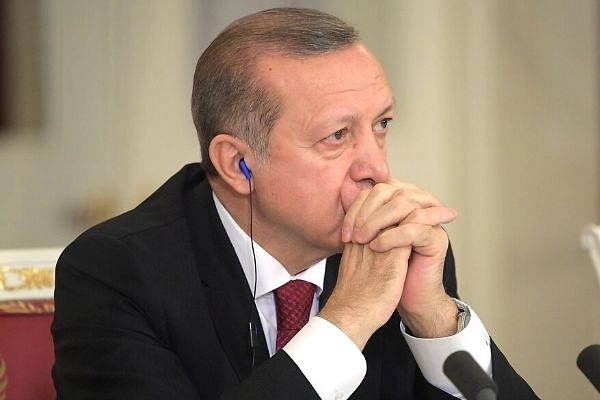Blogs
Why Erdogan's Caliphate Ambitions Are In Jeopardy
- What explains Erdogan's aggressive behaviour? His aspiration to become the Khalifa of the Islamic world, which is in jeopardy now.

Recep Tayyip Erdoğan
Last week, the Financial Action Task Force (FATF), the global money laundering and terrorist financing watchdog, put Turkey on the grey list, in the company of its "true friend" Pakistan. The move will lead to increased monitoring of its activities by the organisation and its members.
“Turkey needs to show it is effectively tackling complex money laundering cases and show it is pursuing terrorist financing prosecutions...and prioritising cases of UN-designated terrorist organisations such as ISIL and al Qaeda,” the FATF has said. [Emphasis added]
A country's entry into the so-called grey list of the FATF is considered a negative development due to a variety of reasons. Among other things, financial institutions and investors consider such ratings while engaging with countries. In Turkey's case, the result was visible right after it was put on the grey list. Its currency, Lira, hit a record low. The country has already been battling double-digit inflation for some time now.
All economic indicators, along with the recent FATF listing, suggest that the Turkish economy will continue to struggle. The direction that Turkey is headed to looks very different from the 2023 vision laid out by President Recep Tayyip Erdoğan a few years ago.
Erdoğan, however, doesn't seem to care.
Just two days after Turkey found itself on the FATF grey list, President Erdoğan ordered his Foreign Minister to expel ambassadors of ten countries, including the United States' envoy to Ankara, as they collectively appealed for the release of Osman Kavala, a philanthropist and civil society leader who has been in prison for four years over charges of espionage and attempting to overthrow the government.
What explains Erdoğan's aggressive behaviour? No one has a firm and absolute answer to this question, but one reason may be his aspirations to become the Khalifa of the Islamic world.
Erdoğan's Caliphate ambitions, however, seem to be in jeopardy. Turkey wants to become the leader of the Islamic world but it has failed to make progress towards this aim so far. Turkey neither has an economy strong enough to have leverages over other countries nor a demographic dividend. So, it is taking a path of disruption to gain prominence. The forging of new geopolitical equations is a part of this strategy.
Last year, the Nordic Research and Monitoring Network released evidence showing Erdoğan has close links with the Islamic State. For years now, Turkey has been accused of being the main consumer of the oil produced by ISIS in the territories under its control. At the same time, Ankara didn’t miss any chance of attacking Syrian Kurds, who were fighting against ISIS, once the Donald Trump administration withdrew its support.
Closer to home, Turkey has been actively making statements on Kashmir, interfering in a bilateral issue between India and Pakistan.
Turkey became the vociferous opponent of India’s move to render Article 370 inoperable. It continues to raise the Kashmir issue on multiple international platforms — most recently at the United Nations General Assembly. In 2020, Erdoğan labelled the Delhi riots a ‘massacre’ of Muslims.
In India's neighbourhood, Turkey helps Bangladesh on the Rohingya refugees issue saying it is one of the main foreign policy objectives for the country. But on the other hand, Ankara withdrew its ambassador from Bangladesh recently, when the latter executed hardline Islamists for helping Pakistani forces commit genocide during the war of independence.
Turkey, despite being a member of the North Atlantic Treaty Organisation or NATO, has embraced Russia. It has ordered S-400 missiles from Russia, even at the risk of attracting sanctions under the US' Countering America's Adversaries Through Sanctions Act.
However, one should not make the mistake of counting Turkey in the Russian camp. More recently, Ankara pledged support to Ukrainian amid a buildup of the Russian forces along its border, irking Russia. Turkey has also started defence cooperation with the country.
And the most hypocritical stand of Turkey is seen in its relations with Israel. Although both have formalized relations since 1949, Ankara opposed the normalisation of Tel Aviv’s relations with the United Arab Emirates and Bahrain. Even during the 2021 Israel-Palestine conflict, it took an aggressive stand against Israel, but without breaking diplomatic ties with Israel or downgrading economic relations with it.
Turkey under Erdoğan is a strange confluence of aggression and hypocrisy. Disrupting the established order seems to be its only intent.
Introducing ElectionsHQ + 50 Ground Reports Project
The 2024 elections might seem easy to guess, but there are some important questions that shouldn't be missed.
Do freebies still sway voters? Do people prioritise infrastructure when voting? How will Punjab vote?
The answers to these questions provide great insights into where we, as a country, are headed in the years to come.
Swarajya is starting a project with an aim to do 50 solid ground stories and a smart commentary service on WhatsApp, a one-of-a-kind. We'd love your support during this election season.
Click below to contribute.
Latest